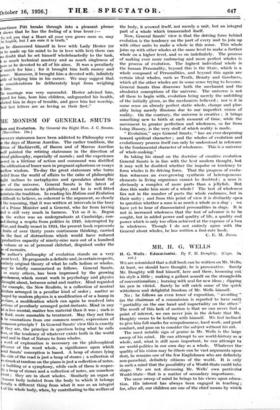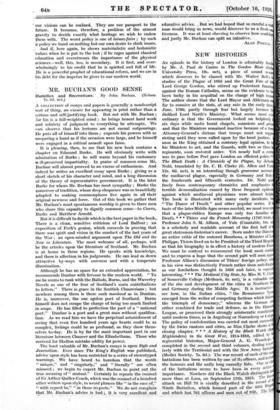. MR. H. G. WELLS
H. G. Wells : Educationist. By F. H. Doughty. (Cape. 5s.: net.) .
Wu are astonished that a dull book can be written on Mr. Wells. At least, we should have thought, he is provocative. Surely Mr. Doughty will find himself, here and there, loosening out : his style a little ; making a gallant assault on the strongholds of conventionaliim ; burning with zeal for new ideas ; dipping . his pen in vitriol. . Surely he will catch some of the quick wittedness and delightful freedom of Mr. Wells himself. •
• No ; he follows an even tenor of exposition, " avoiding " (as the chairman of a commission is reported to have said) ‘: partiality -on the one hand and impartiality on the . other." The result of this lack of motion is that we can never find a point of interest, we can never join in the debate that Mr. Doughty seems to be holding with himself. We feel inclined to give him full marks for scrupulousness, hard work, and good • conduct, and pass on to consider the subject without his aid. • - The most notable sign of genius in Mr. Wells is the largo' sweep of his mind. He can attempt to see world-history: as a • whole, and, what is still more important, he can attempt to see world-politics in our own day as a whole. Whatever the
quality of his vision may be (there can be vast arguments upon that), he remains one of the few Englishmen who are definitely non-parochial, definitely citizens of the world. It is only in such a mind that the possibility of a World-State could take shape. We are not discussing Mr. Wells' own particular World-State--that is a matter of secondary importance.
The same sweep of mind he brings to his views upon educa- tion. His interest has always been engaged in teaching ; for, after all, our children are one of the chief means by which our visions can be realized. They are our passport to the future. It becomes, therefore, a problem of the utmost gravity to decide exactly what heritage we wish to endow them with. The worst policy is one of laissez-faire ; by such a policy we hand on nothing but our own desire to shirk issues. , . And if, here again, he shows materialistic and hedonistic values when he is put to the test ; if he rages against classical education and overs tresses the importance of the physical sciences—well, this, too, is secondary. It is first, and over- whelmingly to his credit that he is spirited and full of life. He is a powerful prophet of educational reform, and we are in his debt for the impetus he gives to our modern world.























































 Previous page
Previous page